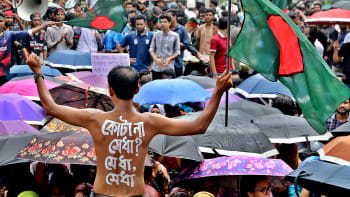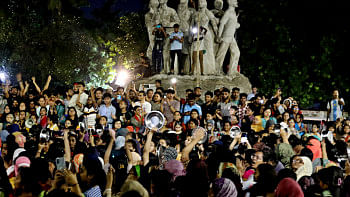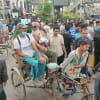An independent Bangladesh is enough for me

I am a grandchild of a freedom fighter. My Nana did not fight the Pakistan Army in the battlefront, but as a railway official in 1971, he used train coaches to transport arms and ammunition to freedom fighters. When the Pakistani authorities learnt of his actions, Nana had to spend months as a fugitive, which took a toll on him both mentally and physically. His contribution was recognised by the Bangladesh government. He got promoted after the war, and also received a plot in Dhaka. Though he did not live long enough to build a house there and reside in it, his children, grandchildren and great grandchildren are reaping the benefits of that reward: a place to call our nanabari/dadabari. But, in my opinion, the biggest reward that my cousins and I and our children received, thanks to my Nana and thousand others like him, was Bangladesh—a independent nation, where, I believe, we enjoy much more privilege than our parents did growing up in East Pakistan.
Bangladesh was under Pakistani rule for more than two decades. I don't know how much change my parents witnessed during that time, but in my lifetime, in independent Bangladesh, two decades meant a huge transformation. I will give a tiny example. My earliest memory of travelling to our village in the Narsingdi district in the 80s was crossing a river on a ferry and parking our car at the house of a local influential politician. We had to walk the rest of way to my dadabari on an earthen road. By 2000, there was no need for a ferry to cross the river anymore, and our car could drive right up to the gate of our village home. The serene landscape of green rice fields one could see after crossing the Shitalakkhya Bridge all the way to our village also disappeared gradually, being replaced by numerous factories and mills. In the 80s, poor young men and women from our village would come to Dhaka looking for employment opportunities often as domestic help or for other low-skilled jobs. That changed at the turn of the century, so much so that it became difficult to find even agriculture labourers in our village anymore. That happened largely because of the factories that grew on the outskirts of Dhaka.
Some may argue that the change Bangladesh experienced can also be attributed to the global advancement of technology and economy. But is it not true that, after independence, whatever we produced in this country were spent in the development of this country and not some distance land to the west? And it is us, the post-independent generations, who are the beneficiaries of that development.
At a personal level, I believe the change Bangladesh went through helped me and my cousins attain good education and subsequently get jobs, which may not pay enough to buy a goat worth Tk 15 lakh, but help us get by and put food on our plates at least three times a day. None of us hold a government job. Whether we were talented enough to even try for a government job is a different question. Most of us never actually took the BCS exams or the recruitment tests in Bangladesh Railway. I don't think getting a government job was ever our dream—not mine, at least. Growing up in the 80s and 90s, we were attracted to private jobs because the remuneration was way better than any government job. The only government job that sounded "cool" was that in foreign service and our relatives who worked in that government wing scored the highest marks in their public examinations throughout. Mind you that was a different era and only one or two persons could stand first in the public examinations among thousands of students in the entire country. So foreign service remained an unattainable dream, which was not even worth trying for.
One reason why my cousins and I were able to live a more or less privileged life in independent Bangladesh is our parents' hard work. They, too, had an advantage over others. They were educated, and were able to cultivate that privilege so they never needed to rely on any quota system to get jobs. In fact, three of my four uncles worked in the private sector, and my eldest uncle who worked in a government bank had secured the job before 1971. It can be argued that, unlike my uncles, descendants of many freedom fighters might never have had the privilege of a good education to start with. Mere recognition would not have helped improve their situation. Whatever little the state offered them to make their situation better right after liberation was much-needed. In fact, the state could have done more. The political instability the country went through in the mid-70s and 80s denied many freedom fighters and their heirs their rights to access those state benefits. But did things not change in the 90s? Were the children and grandchildren of freedom fighters not able to use the preferential system in the 90s when the Awami League was in power? That should have helped many, who were deprived before, to change their fate by securing government jobs.
The point I am trying to make is, people have had five decades in independent Bangladesh to make their lives better. During that time, at least two generations must have grown into adulthood, and despite all the corruption and crimes in the country, their lives must have been impacted to some positive extent by the country's economic development. If that did not happen, then it is a total governance failure. It is the failure of all the governments Bangladesh has had that the country's progress only touched a privileged few, created opportunities only for a handful, so much so that many want to rely on preferential treatment rather than on their own merit to attain some kind of job stability in their lives. It is also a failure of our policymakers and industrialists that they could not create enough employment opportunities in the private sector in 53 years so that young people, like their Western counterparts, would aspire for jobs in private enterprises or want to be entrepreneurs themselves.
While I never had to use any preferential treatment as a freedom fighter's grandchild, today I feel if I had to, I would have felt ashamed to use it especially after so many deaths surrounding this issue. Like I said, my Nana's contribution to the Liberation War has given me a country to call home. A 45-year-old like me in Palestine does not have that privilege. How well I use this gift depends on my own capability. For my descendants, the last thing I want is preferential treatment for their ancestors' legacy. They should undoubtedly be proud of and thankful for their ancestors' achievement, but also should have the dignity to make their own names on their own merit.
Tamanna Khan is a member of the editorial team at The Daily Star.
Views expressed in this article are the author's own.
This article was published in print on July 22, 2024. Owing to the internet shutdown from the evening of July 18 to July 23, it is being uploaded online on July 24, 2024.
Follow The Daily Star Opinion on Facebook for the latest opinions, commentaries and analyses by experts and professionals. To contribute your article or letter to The Daily Star Opinion, see our guidelines for submission.

 For all latest news, follow The Daily Star's Google News channel.
For all latest news, follow The Daily Star's Google News channel. 









Comments